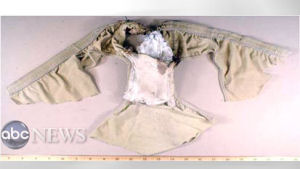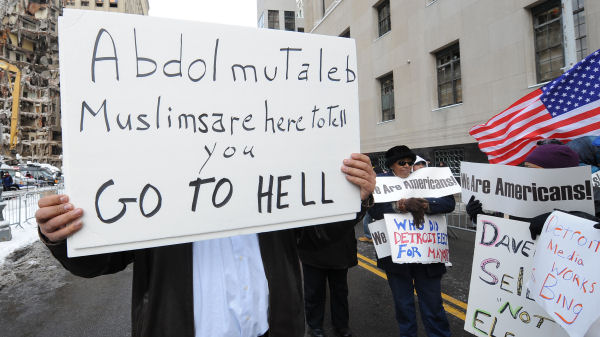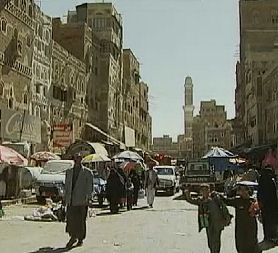Reporter met Detroit bomb suspect
Exclusive: a member of an investigative team working for Channel 4 News met Abdul Farouk Abdulmutallab, the Nigerian now charged with trying to blow up an airliner bound for Detroit.
Reporter Jamal Osman met suspect Umar Farouk Abdulmutallab in October 2009, during the course of a Channel 4 News investigation into the radicalisation of young foreign students at language and religious schools in Yemen.
They met at a juice bar in the capital Sanaa after being introduced by a British Muslim studying in the capital at the same time.
“He struck me as a quiet man,” Osman said. “A devout Muslim who covered his head like many Muslims do. I didn’t believe he would do such things and I didn’t know he was going to do these things.”
Christmas Day terror
Umar Farouk Abdulmutallab is thought to have got on a plane in Lagos, before changing planes and to a Northwest Airlines Flight 253 at Schiphol airport in Amsterdam on 25 December 2009.
The plane left Amsterdam with 290 people on board. It was not until the plane was approaching its destination, Detroit, when the suspect tried to ignite a device in his underwear.
Abdulmutallab, who suffered extensive burns, was overpowered by passengers and crew on the flight.
“We believe this was an attempted act of terrorism,” a White House official confirmed.
Since he was captured by his fellow passengers, Mr Abdulmutallab has reportedly told the FBI that al-Qaida in Yemen is coaching 20 more suicide bombers to take his place.
Channel 4 News began investigating the radicalisation of foreign students in Yemen last year, three months before the Nigerian was accused of trying to bomb an American passenger jet on Christmas day.
A 19-year-old British Muslim from south London told last night’s programme that the possibility of being brainwashed during an Islamic religious studies course in Yemen was always there.
“If it is God’s will, I will follow in his footsteps,” he said of the Detroit suspect, adding that this was not his intention. “It might be that what he is doing is wrong. I would not like to associate with him or do what he is doing. But it is up to him what he is doing.”

“It is God’s will who is led astray,” the Londoner added. “The more dangerous, I don’t associate with them. If you associate with them, you could get brainwashed. You never know what could happen.”
Of particular concern to foreign observers is Sanaa’s al-Iman University, where 4,000 students from all over the world are enrolled at an institution with a reputation as a favourite breeding ground for al-Qaida.
The rector and founder, Sheikh Zindani, is a political ally of Yemen’s president and was once the spiritual mentor of Osama bin Laden, who has Yemeni ancestry. The sheikh is designated a “global terrorist” by the US and UN. Though Mr Zindani denies links to al-Qaida, western diplomats claim Sanaa’s tolerance of such radical clerics must now stop.
The sheikh’s son, Dr Abdullah al-Zindani, told Channel 4 News that the university did not support al-Qaida, which comes from “places where there is ignorance and no good teaching.”
“We condemn action which harms others,” he said.
The university confirmed to Channel 4 News that the cleric Anwar al-Awlaki had prayed at the university mosque. Mr al-Awlaki is believed to have inspired last November’s shooting at Fort Hood army base in Texas, which left 13 people dead and more than two dozen injured.
Mr al-Awlaki, who is now thought to be hiding in the Yemeni desert, is also believed to have recruited the Nigerian suspect for the Detroit attack, while Mr Abdulmutallab was improving his Arabic at a Sanaa language school.
Yemen’s deputy prime minister has claimed that the student joined al-Qaida in London, where he took courses at University College, but British and American officials say he was armed and trained in Yemen.

In Sanaa’s Dairi district, where the Nigerian socialised with fellow students, Channel 4 News encountered Muslims from Lyon in France and New Jersey in the USA, who angrily claimed that a witch hunt against innocent and devout foreign students had begun, with several taken away for questioning.
Abdul-Ghani Al-Iryani, a political analyst, described the Nigerian as “the tip of an iceberg of international jihadis, coming here to study Arabic and to be further radicalised by al-Qaida.”
Meeting the alleged bomber, by Jamal Osman
In October 2009, I went on an assignment in Yemen for Channel 4 News. The story I pitched to the editor was to see whether Muslims from Britain travel to Yemen for religious purposes or do they train as jihadists.
Prior to my trip, Yemen was rising on the news agenda. Although the media was mainly focusing on the conflict in Sa'ada region between the government and the Huthis, some were talking about the growth of al-Qaida in Yemen. So I went to find out the truth about the link between British-Muslims and al-Qaida in the country.
During my stay in Sanaa, I met many people, British and non-British, Muslim-born and Muslim-converts. As part of my research, I arranged to meet a British Muslim, "Ahmed", through a source in the city.
Ahmed is one of the students from Britain studying Islam in the country.The meeting took place at Thalaj Abyadh, the White Ice Café on Khawlani Street in the Daa'iri district. As I entered the café, I spotted Ahmed who was sitting behind the door on the left-hand-side.
He was with another man."You must be Jamal," he said."Yes, how do you know? Is it because I've got big belly? Perhaps I should stop eating fish and chips," I joked.
Then Ahmed introduced me to "a Nigerian, who has studied in the UK". That was Umar Farouk Abdulmutallab, the man accused of trying to blow up a US plane on Christmas Day.
Initially, after the Christmas incident, I didn't realise Omar was the man I'd met in the café. But, after seeing different photos of him on television, I realised it was him. I had to contact a friend of mine in Sana'a, who was accompanying me at the time and he confirmed to me that the man was Umar.
As an ambitious journalist who is obsessed with getting scoops, exclusives and so on, my immediate reaction was: "How did I miss that. I should have interviewed him.
"The event has led to a full scale review of security on planes in the west and an investigation by President Obama into the failings of his security services, and burst the bubble of comfort many had begun to feel after a sustained period free from incidents or threats.
Air travellers from 14 countries will be subjected to extra body pat-downs and advanced screening of baggage before boarding airliners bound for the US. Even though it was fairly a brief encounter I could not accept the man I met in the café would be involved in the incident that triggered worldwide security alarm.

I never thought he would be accused of such actions and I had no idea he apparently had these plans.
Umar, who seemed a quiet and devout Muslim, was wearing a typical Islamic dress and covering his head with a male-scarf. Immediately, I started talking about the Nigerian politics especially the conflict in the Niger Delta and the tensions between the foreign oil corporations and some local ethnic groups.
As Umar was a Nigerian I had to rule him out of my potential story as I was concentrating on British people. I do not remember the exact words we exchanged, as I wasn't focusing on him.
But I vaguely recall him giving a very short answer saying something like: things happen with God's will and we have to accept that it is beyond our power.
I replied something like: perhaps I shouldn't criticise other nations when I am from Somalia. "I vaguely recall him saying: things happen with God's will and we have to accept that."
We (Somalis) should get our house in order before talking about others.It was difficult to hear one another because there was an electricity generator outside the premises. Consequently, after a very short conversation, Ahmed and I left the café to go to a quieter place nearby. I was with him for about an hour discussing his stay in Yemen and his overall experience.
He sounded a very peaceful man who doesn't condone violence. And I believed him. A 19-year-old from south London whom we interviewed put the matter in a nutshell.
He said: "There are many people who study here - and there are some who go and do their thing. I can't vouch for them. I do my thing. What I know is that the majority of brothers and sisters come to learn. And that's it."
My view is that Yemen may be in a terrible security state but that doesn't mean it would be the "next Afghanistan".
More importantly, it's wrong to describe all British Muslims who come here as terrorists. I am sure there are few bad apples in every society but the vast majority of them are seeking to improve their understanding of Islam.
There are many success stories. For instance, I met a 23-year-old from London who told me that he was in and out of jail when he was in the UK. Now, he is someone who appreciates life and has turned his life around for the good.
He believes that had he not come to Yemen he would still had been carrying on his old lifestyle.
-
Latest news
-
‘I violated my moral compass working for Trump,’ former lawyer testifies3m

-
Working class creatives in film and TV at lowest level in decade5m

-
Israeli police investigating attack on Gaza aid convoy4m

-
Biden announces major tariff increase on Chinese-imported green tech3m

-
‘If NHS can afford it, people with obesity should have Semaglutide,’ says weight loss expert5m

-




